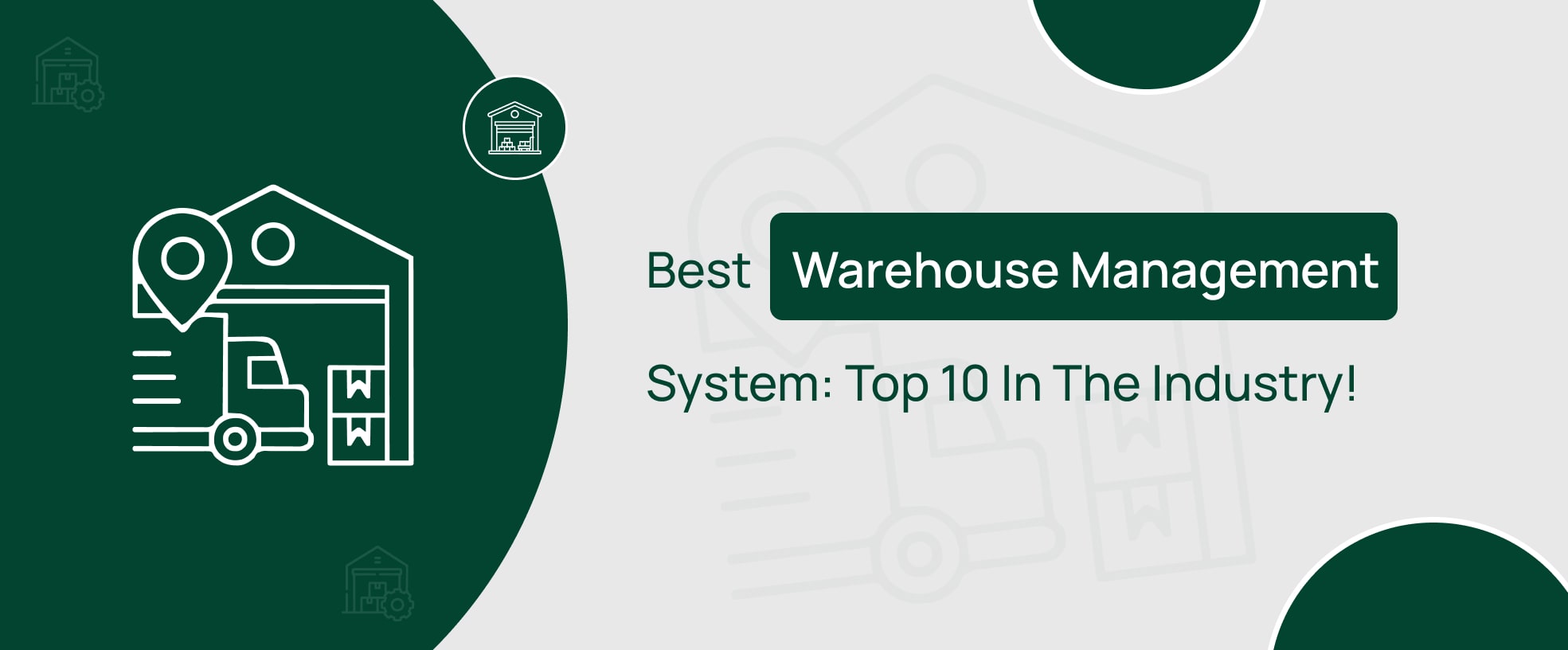Best Warehouse Management System: Top 10 In The Industry!

Experiencing low productivity, high costs, or inefficiencies? Here, we’ve carefully curated the best warehouse management system. Unlock the true potential of your warehouse operations with these top-rated keys!
Imagine a cluttered warehouse filled with thousands of shipments. Would it be possible to find items manually, pack and ship them? Not!. Here’s where the role of WMS comes in. A WMS, or Warehouse Management System, is designed to monitor, manage, and streamline logistics operations.
A warehouse management system (WMS) handles all warehouse management tasks from when supplies enter the inventory until orders are fulfilled. Implementing the best WMS means more efficiency, faster processes, and better accuracy, leading to high productivity.
Little-Known Statistics About WMS!
Top 10 Warehouse Management Systems
Here are the 10 best warehouse management systems for your daily warehouse requirements.
#1 – CommuteLogix by iCommuneTech
CommuteLogix is a well-known WMS that is highly scalable and suitable for businesses of all sizes. It offers seamless inventory tracking, advanced automation, and AI-powered analytics to optimize warehouse operations. iCommuneTech, the software provider of CommuteLogix, has been providing WMS excellence for more than ten years.
You can choose a cloud-based or on-premise deployment model based on your business needs. Additionally, good ongoing technical support is available.
Key Features:
CommuteLogix also leads the market for the best sensor support, warehouse management invoice creation, etc.
Why CommuteLogix?
CommuteLogix serves as a comprehensive solution for tackling all warehouse challenges. It integrates seamlessly with your existing ERPs or e-commerce platforms. Over the years, this software’s service provider has earned the trust of numerous businesses worldwide.
Check Out CommuteLogix Now!#2 – Microsoft Dynamics 365 Supply Chain Management by Microsoft:
An intelligent, cloud-based Microsoft Dynamics 365 supply chain management model provides real-time visibility and enhanced AI-driven insights. It is highly recommended when potential warehouse issues need to be addressed. The model is easy to integrate and configure with existing systems. Additionally, Microsoft offers robust security to keep all data completely safe.
Key Features:
#3 – Oracle Fusion Cloud Warehouse Management by Oracle:
Oracle is a well-known brand in the market. Its popularity stems from its powerful features, seamless integration, and user-friendly interface. The strength of the cloud can improve your logistics operations, making them faster and more efficient. The cloud capability of WMS leads to better management of the supply chain.
Key Features:
#4 – Korber Warehouse Management Systems by Korber Supply Chain:
Korber is a market leader in providing end-to-end software solutions. Korber WMS manages the supply chain. It is suitable for businesses of any size, industry, or strategy. Companies can conquer the supply chain’s complexities with Korber’s voice and robotics solutions.
Key Features:
#5 – Luminate Logistics by BlueYonder:
BlueYonder’s software revolutionizes the entire supply chain. Manufacturers, retailers, and numerous other service providers that rely on logistics services trust Luminate Logistics. It is renowned for its efficient planning, quicker order fulfillment, timely delivery, and returns. This AI-driven WMS features a multi-tiered network for enhanced accuracy and forecasting.
Key Features:
#6 – SAP Extended Warehouse Management by SAP:
SAP EVM is a modern, automated WMS that provides a detailed view of stocks. It is best known for its advanced algorithms, which track stock levels in real time and prevent over- and under-stocking. The cross-docking features of SAP EVM can be used to move transport units from multiple warehouses.
Key Features:
#7 – Manhattan WMS by Manhattan Associates:
Manhattan WMS is a cloud-based microservice designed to unify and optimize warehouse operations. It enhances warehouse processes through advanced intelligent automation, real-time visibility, and more. It enables the global distribution control of supply, labor, and demand. This cloud-native technology is one of the best warehouse management systems for the top logistic industries.
Key Features:
#8 – Fishbowl Inventory by Diversis Capital Management, LP:
Fishbowl is a recognized WMS that meets the needs of various small businesses. It supports your warehouses in excelling at the fulfillment of orders, from the physical warehouses to dropshipping. It excels in order management, cycle counts, order fulfillment, and more.
Key Features:
#9 – Vinculum WMS by Vinculum Group:
Vinculum is another leading name for the best warehouse management system. It offers a one-stop solution for marketplace listing issues, catalog management, etc. This cloud-based solution can fulfill the needs of both B2B and B2C businesses.
Key Features:
#10 – Infor WMS by Koch Industries:
This tier-1 cloud-based WMS by Koch Industries can transform your warehouse operations. This advanced WMS includes built-in AI capabilities, 3D visualization, embedded analytics, voice processing, and more.
Key Features:
The Role and Importance of Warehouse Management Systems
A WMS is useful for monitoring, managing, and streamlining logistic operations. It reduces errors, improves real-time visibility of supplies, and increases order fulfillment rates. Thus, it is more of a necessity than a choice for controlled and better-managed warehouses. It simplifies all the processes from when supplies enter the warehouses until they are dispatched.
Key Points To Remember While Selecting The Best Software
| Factors | Importance |
|---|---|
| High Level of Scalability |
It helps growing businesses when the software can adapt to their changing needs and locations. |
| Ease of Integration |
So that it can be easily integrated into your present ERPs and e-commerce platforms |
| Cloud-Based |
This deployment model is preferred for remote accessibility and better control |
| AI & Automation |
Advanced levels of algorithms lead to better decision-making and better control. |
| User-Friendliness |
Ease of usage reduces the necessity of training employees. |
Benefits And Advantages of Warehouse Management Systems
There are a lot of benefits and advantages of warehouse management systems apart from just improving efficiency and saving costs. Here is a quick look:
Effective warehouse management can transform a chaotic warehouse into a well-organized one. It can also enhance inventory management, supply chain management, resources, labor, and more. However, the benefits of a warehouse management system often go unnoticed. Here, they are discussed in detail.
Common Challenges Faced & Their Solutions
| Challenge | Solution |
|---|---|
| Inaccuracy in Inventory |
AI-driven forecasting and real-time tracking |
| High costs of operations |
Automation of repetitive tasks leads to better operations. |
| Inefficiency and inaccuracy in order processing |
The latest barcode and RFID technology is the solution. |
Conclusion
In short, getting the best WMS systems for your warehouse operations is no longer a luxury. It is the need of the hour. All the logistics market leaders have already integrated it. So, take the smart move today and bring efficiency, leading to better productivity and profits.
Key Takeaways:
Commonly Asked Questions About WMS:
We get your queries constantly and are happy to resolve them anytime. Here are some commonly asked queries:
1. How much does a warehouse management software cost?
The cost of warehouse management software depends on several factors: the customization you need, the market reputation of the service provider, and the deployment model you choose. Typically, WMS software costs between $100 and $1000 per month.
2. What features should you look for in warehouse management?
To get the best value, look for a few features in warehouse management. Check whether it offers all the features of a warehouse management system , such as inventory visibility, reporting and analytics, order management, labor management, system integration, etc.
3. How do you select the best warehouse management system for your business?
Several factors should be considered when choosing a WMS to get the best value for money. Check out whether it is easy to integrate with your present systems, can be customized, is scalable according to your business’s changing needs, and has all the features of an ideal WMS. Check out reviews, ratings, prices, and more before choosing the software.
4. What are the future trends and technologies for WMS?
Some of the warehouse technologies that would be future trends are:
5. Are WMS customizable according to specific business requirements?
Most WMS solutions can be customized according to businesses’ needs and goals. It is good to choose the ones that are customizable and scalable.
Don’t Let Warehouse Inefficiencies Hinder Productivity and Block Profits!
A small hole in the boat can sink it. Imagine what hundreds of error-prone, inaccurate manual processes could do to your warehouse. It’s better to be safe than sorry later. Integrate our robust and trusted WMS to successfully navigate the tidal wave of logistics operations.
Contact us today!

